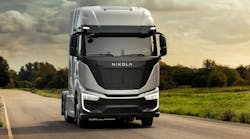Nikola doubles Q4 revenue, delivers first hydrogen fuel cell trucks
More than six months after battery fires plagued its trucks, Nikola Corp. might be bouncing back after posting its fourth-quarter and full-year results.
In December, the company produced and delivered the first of its hydrogen fuel cell vehicles. Thirty-five went wholesale, while seven were reserved for demonstrations and testing. For the full year, Nikola produced 138 trucks, a significant decrease from 2022’s 258 units due to a switch in business focus from battery electric to hydrogen.
“Every truck delivered to dealers is spoken for by an end user, some of which are already utilizing the trucks in operations daily,” CEO Steve Girsky said during the earnings call. He also added later that demand for trucks currently outweighs supply.
Other highlights included:
-
In California, Nikola’s vehicles qualify for HVIP vouchers, which fund the purchase of Class 2b through Class 8 zero-emission trucks and buses. In 2023, 355 of the 360 requested vouchers were for Nikola.
-
Ended Q4 with nothing in its finished goods inventory. Opened its first Hyla modular refueling station east of Los Angeles. Nikola also partnered with FirstElement Fuel for fleets to use that company’s refueling station in Oakland.
-
Talks are progressing with a potential new CFO following Anastaysia Pasterick’s November departure.
Battery recalls hamper Nikola profits, but expenses down
On the financial side, Nikola had a smaller loss in Q4 compared to the same period in 2022, totaling $153.5 million. However, its net loss grew by nearly 20% for the entire year to $988 million. The company’s gross loss for the year was $214.1 million, a massive decline from Q3’s loss of $125 million. Controller Brian De Hoog attributed most of the loss to the company’s battery-electric truck recall. The number also included a $65 million reserve for “estimated recall costs” and a write-down for “BEV battery pack and other BEV inventory components.”
Girsky and his team expect all trucks recalled to be back in end users’ hands late this summer, with the first being received later this quarter. The vehicles will have been retrofitted with new battery packs, driver enhancements, and software updates.
Quarterly revenue was $11.5 million, more than double from the last three months of 2022. While it was within Nikola’s guidance of $11.25 million to $18.75 million, it still fell short of analysts’ expected $13 million.
Operating expenses for Q1 2024 are projected to be between $72.5 million and $77.5 million, a decrease from Q4’s $89.6 million and, according to De Hoog, the highest they will be all year.
“We expect operating expenses to decline further throughout the year as we complete the battery electric truck recall and reduce hydrogen fuel cell electric truck engineering and validation activities,” he said. “We are now focused on production.”
Executives also expect full-year hydrogen and other revenue from $10 million to $12 million, with a total truck production guidance of 300 to 350 vehicles.
Shares of Nikola (Ticker: NKLA) opened at $0.71 per share and dropped to $0.69 per share after reporting earnings. Over the past six months, the share price has steadily dropped from a September high of $1.65.




